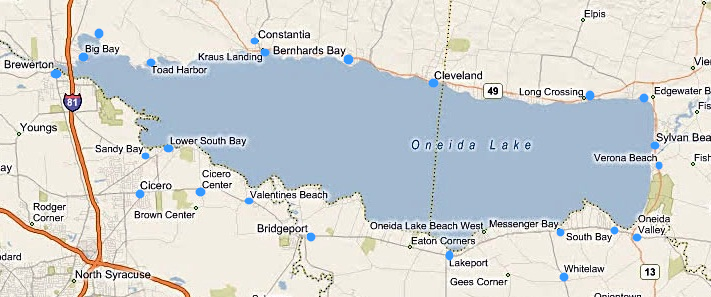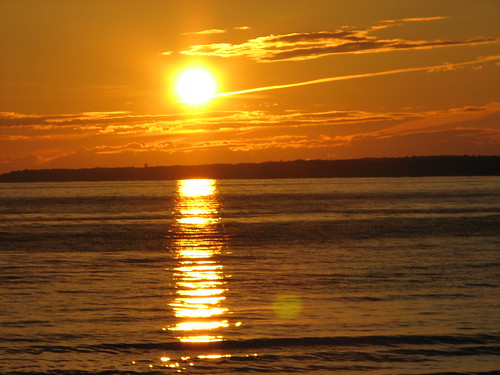Blue Highways: Ironton, Ohio
Unfolding the Map
 We have traveled far, and are now in the last chapter of Blue Highways. We pass through Gallia County, which provides some nice contrasts of nature and progress, and then through Ironton, which once served as an engine of progress for the United States in its production of pig iron. To see where Ironton sits, please see the map.
We have traveled far, and are now in the last chapter of Blue Highways. We pass through Gallia County, which provides some nice contrasts of nature and progress, and then through Ironton, which once served as an engine of progress for the United States in its production of pig iron. To see where Ironton sits, please see the map.
Book Quote
"'Inquire Locally,' the road should have been marked. Of the thirteen thousand miles of highway I'd driven in the last months, Ohio 218 through Gallia County set a standard to measure bad road by with pavement so rough I looked forward to sections where the blacktop was gone completely. Along the shoulders lay stripped cars, presumably from drivers who had given up. Yet the sunny county was a fine piece of washed grasses, gleams in hounds' eyes, constructions of spiders, rocks broken and rounded - all those things and fully more.
"At Ironton I took the river road down a stretch of power lines, rail lines, water lines, and telephone lines (the birds sleep across the water on the wooded Kentucky bluffs, they say)...."
Blue Highways: Part 10, Chapter 4
 Aerial photo of downtown Ironton, Ohio. Photo hosted at City Data. Click on photo to go to host page.
Aerial photo of downtown Ironton, Ohio. Photo hosted at City Data. Click on photo to go to host page.
Ironton, Ohio
The interesting thing about Blue Highways, as we head into this last chapter of the book, are the contrasts that LHM writes about that you might miss if you don't pay attention. I know that as I read the book, I sometimes get too caught up in where he's going, and I miss a few interesting things that are whizzing by the van in my anticipation of what town is next, or what person he might begin talking to.
It's those moments where I really get into the text that I realize that these juxtapositions are all over the place in the book for us to compare with each other. In the text above, it is easy to just glance past a theme that permeates many parts of the book. LHM makes a subtle contrast between broken down and intrusive human-made features of the landscape - the rough road, the abandoned vehicles, power lines, rail lines, water lines and telephone lines - and the sunny county, the fine and washed grasses, gleams in hounds eyes, spider webs, and rocks. The human made stuff is presented as obstacles. The road is horrible, the cars have an air of futility.
Signs of progress, such as the lines that provide power, transportation, water and telephone, are intrusive. I love how LHM writes that the birds don't even use the power lines, preferring the natural trees and bluffs across the river.
I probably come across sometimes as anti-modern in these posts as I decry some of the harmful effects of technology and progress. I'm not. I'm as fascinated by progress as anyone. I'm sitting here typing this on a four year old laptop that is woefully out of date. It was the height of progress when I bought it, but now it is too bulky, a dinosaur compared to the sleek MacBook Pro that my wife is cursing at right beside me (she's attempting to figure out WordPress and having a devil of a time). I'd love a new computer. I have a smart phone in my pocket and am waiting to get the newest Samsung Galaxy III. We have a Sony 19 inch TV that we got probably 10 years ago from a friend, and I dream of getting an LED or LCD flat panel screen TV sometime. I regularly surf the web on an iPad provided by my job.
I read with gusto the latest scientific accomplishments, from the micro to the macro, from the human body to the depths of the universe. I watch science fiction avidly, and am never happier than when immersing myself into Star Trek, Firefly or Battlestar Galactica. I dream of what the world might be 50, 100, 1000 or even 10,000 years in the future.
Yet I'm no Pollyanna. I see serious problems with progress. It has made life better for billions of people, but it has also created just as many hazards as benefits. Because of progress, the world is becoming seriously overpopulated. The world is beginning to feel the adverse effects of climate change brought on by industrialization and modernization and I understand that the effects will only get worse. Millions of deaths and casualties are possible at the touch of a button. Groups that fear progress, or feel left out of the benefits, have grown terrorism from a global nuisance to a global problem. Antibiotics have cured untold millions, but have also helped evolve "super bugs" which are harder to cure.
And some progress just hasn't happened like we were promised. Cars do not run on water, they are still running modified versions of the original internal combustion engine, a concept essentially unchanged since its inception over 100 years ago. Nor are there any feasible flying cars. We haven't colonized the moon, or Mars, and in fact haven't sent any person beyond earth orbit since the last Apollo mission in the 1970s. We could be snuffed out in an instant by a well-aimed asteroid. And for all our signals to the cosmos, there has been nary a peep back - not even a hiccough.
We are still at the mercy of floods, tsunamis, earthquakes, hurricanes, tornadoes and other natural phenomena. People still pick up guns and kill each other in shopping malls, theaters, schools and battlefields. We are just as likely to go to war as we ever were. Poverty still exists, even in the richest nations on earth. People still die of starvation. In the midst of health care crises, we still argue over whether the government should provide basic health care to everyone. We still expect much, and are yet unwilling to pay for it. We are still willing to take and exploit, but not willing to give back much.
To me progress is all it promises, and it is nothing of what it promises. Which is why I probably identify so much with what LHM writes on a deep level. I can appreciate the seemingly simple, intuitively complex beauty of nature just as he does. Despite my love and appreciation of progress, I can still get lost in the beauty of trees, grass, the gleam in my dog's eye, and birds in the branches. If I get caught up in the modern world, it flashes by like scenery in the windows of LHM's van. But when I take time to notice, and take in the world as it is, without the flash of progress, I often find peace.
Musical Interlude
The topic of progress dovetails nicely with Ironton, which at one time supplied the pig iron used to build industrial America. That seamlessly fits with Johnny Cash and The Legend of John Henry's Hammer. Below is the live recording from his famous Folsom Prison concert.
If you want to know more about Ironton
City of Ironton
Ironton Rally on the River
Ironton Tribune (newspaper)
Ohio University Southern
Wikipedia: Ironton
Next up: The Ohio River Towns (Franklin Furnace, New Boston, Portsmouth, Friendship, Manchester, Utopia)




 Thursday, January 24, 2013 at 10:58AM
Thursday, January 24, 2013 at 10:58AM






